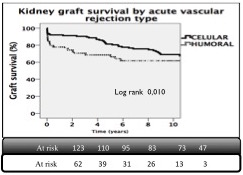Antibody-Mediated Vascular Rejection of Kidney Allografts: What Does It Happen After 15 Years?
1Nephrology, Hospital Clínico San Carlos, Madrid, Spain
2Histopathology, Hospital Clínico San Carlos, Madrid, Spain
Meeting: 2017 American Transplant Congress
Abstract number: A1
Keywords: Antibodies, Rejection, T cell graft infiltration
Session Information
Session Name: Poster Session A: Antibody Mediated Rejection in Kidney Transplant Recipients I
Session Type: Poster Session
Date: Saturday, April 29, 2017
Session Time: 5:30pm-7:30pm
 Presentation Time: 5:30pm-7:30pm
Presentation Time: 5:30pm-7:30pm
Location: Hall D1
OBJECTIVE:To examine the association between subtypes of AVR and graft loss. We assessed patients who provided biopsy samples for acute allograft rejection, between 1998 and 2014. To investigate distinct rejection patterns, we retrospectively assessed rejection episodes with review of graft histology, and donor-specific anti-HLA antibodies. RESULTS: 1004 patients were biopsied and included in the main analyses, of which 259(32.87%) had acute biopsy-proven rejection. We identified 3 patterns of graft rejection defined according to the presence of peritubular capillaritis (ptc): a) T cell-mediated acute vascular rejection (TAVR),if ptc-free; b) humoral-mediated acute vascular rejection (HAVR), if ptc>0 and c) T cell-mediated rejection (AVR-none), if vasculitis=0 and ptc=0 (148[57%], 70[27%], 41[16%] respectively).At 5years, graft survival was lower among patient with ptc-vascular rejection than those with T cell vascular rejection(72.3%vs83.2% p0.010). T cell-mediated rejection without vasculitis had comparable survival than rejection absence (89.3%vs89.2% p0,698). Multivariate analysis showed that risk of graft loss was higher in biopsies with high scores of glomerulitis(g2-g3); vasculitis(v2-v3), capillaritis(ptc2-ptc3) or interstitial inflammation(i2-i3).
Multivariate analysis showed that risk of graft loss was higher in biopsies with high scores of glomerulitis(g2-g3); vasculitis(v2-v3), capillaritis(ptc2-ptc3) or interstitial inflammation(i2-i3).
| RISK FACTOR (COX) | OR | IC 95% | P |
| Age | 1.03 | 0.99-1.06 | 0.059 |
| Sex | 0.69 | 0.28-1.68 | 0.408 |
| t2-t3 | 0.67 | 0.26-1.74 | 0.409 |
| i2-i3 | 3.27 | 1.45-7.57 | 0.006 |
| v2-v3 | 2.73 | 1.20-6.17 | 0.016 |
| ptc2-ptc3 | 2.84 | 1.23-6.58 | 0.014 |
| g2-g3 | 2.87 | 1.19-9.96 | 0.019 |
| DSA | 2.43 | 0.90-6.20 | 0.064 |
CONCLUSIONS.We conclude that the antibody-mediated acute vascular rejection involves a poor prognosis than the Tcell-mediated acute vascular rejection. The presence of tubulitis do not seem to determine a poor long term renal graft prognosis.
CITATION INFORMATION: Rodriguez Cubillo B, Perez Flores I, Moreno De La Higuera M, Calvo M, Calvo Romero N, Pascual A, Cortes J, Blanco J, Sanchez-Fructuoso A. Antibody-Mediated Vascular Rejection of Kidney Allografts: What Does It Happen After 15 Years? Am J Transplant. 2017;17 (suppl 3).
To cite this abstract in AMA style:
Cubillo BRodriguez, Flores IPerez, Calvo M, Romero NCalvo, Pascual A, Cortes J, Blanco J, Sanchez-Fructuoso A. Antibody-Mediated Vascular Rejection of Kidney Allografts: What Does It Happen After 15 Years? [abstract]. Am J Transplant. 2017; 17 (suppl 3). https://atcmeetingabstracts.com/abstract/antibody-mediated-vascular-rejection-of-kidney-allografts-what-does-it-happen-after-15-years/. Accessed February 12, 2026.« Back to 2017 American Transplant Congress
